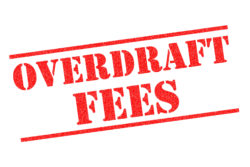 Excessive overdraft fees are a problem for millions of consumers in the United States, which often compound their financial difficulties. While excessive overdraft fees most commonly impact those who have lower incomes, these insufficient fund fees can anyone who loses track of their account balance.
Excessive overdraft fees are a problem for millions of consumers in the United States, which often compound their financial difficulties. While excessive overdraft fees most commonly impact those who have lower incomes, these insufficient fund fees can anyone who loses track of their account balance.
According to the U.S. Justice Department, Congressman Duncan Hunter of California recently got into trouble due in part to accumulating excessive overdraft fees, allegedly in the course of misusing campaign funds. Hunter was indicted for allegedly misusing approximately $250,000 of campaign funds, some of which was used to cover 1,100 overdraft fees incurred in the last seven years.
Even though Duncan had over $250,000 his disposal, he and his family had reportedly overdrawn their checking account over 1,100 times and accumulated approximately $38,000 in excessive overdraft fees. The DOJ further stated that Duncan and his wife had used this campaign money to pay for personal expenses, when the money was supposed to be used for campaign purposes.
While Duncan’s alleged misuse of campaign funds is less than proper, it also highlights the problem of excessive overdraft fees.
Overview of Problems of Excessive Overdraft Fees
According to a recent Moebs Services report, American consumers are paying approximately $34.3 billion in overdraft fees in 2017, which is the most consumers have pad since 2009 during the recession.
The report states that part of the reason is that overdraft fees have risen over the years, with the average overdraft fee at $30 compared to the average of $20 in the year 2000.
The Pew Charitable Trusts states that a small consumer population is responsible for the overdraft rate rising, which stem from debit cards and other direct money withdraw methods overdrawing the accounts.
Approximately one fifth of consumers pay over 90 percent of overdraft fees, which are caused by debit cards, checks, and electronic account transfers overdrawing their accounts. These consumers are often in financially vulnerable positions, with most of them stating they have trouble keeping up with monthly payments.
Overdraft protection was originally created to help prevent embarrassing occurrences of card decline, and help prevent the consumer’s financial problems from getting worse. However, banks and credit unions have recently started using overdraft protection as a means of abusing their customers’ financial situation by introducing excessive overdraft fees and maximizing the chances of occurrences.
Banks and credit unions have recently been accused of using deceitful methods to charge overdraft fees, including processing transactions in order of amount rather than by date to increase the chance of account withdrawal.
In August 2010, the federal government made it illegal for banks and credit unions to sign customers up for overdraft protection without their consent. Even though this law is in place, the Pew has found that many customers are not aware of this, along with the fact that they can opt out.
Failure to provide this disclosure to customers can lead to legal trouble for the bank or credit union, so it is important for financial institutions to confirm they are adhering to federal standards.
Customers who believe they are facing unfair excessive overdraft fees may be able to file legal action against their respective banks or credit unions.
Do YOU have a legal claim? Fill out the form on this page now for a free, immediate, and confidential case evaluation.
The attorneys who work with Top Class Actions will contact you if you qualify to let you know if an individual lawsuit or class action lawsuit is best for you. Hurry — statutes of limitations may apply.
ATTORNEY ADVERTISING
Top Class Actions is a Proud Member of the American Bar Association
LEGAL INFORMATION IS NOT LEGAL ADVICE
Top Class Actions Legal Statement
©2008 – 2025 Top Class Actions® LLC
Various Trademarks held by their respective owners
This website is not intended for viewing or usage by European Union citizens.
Get Help – It’s Free
Join a Free Bank Overdraft Fee Class Action Lawsuit Investigation
If your bank and credit union has engaged in deceptive overdraft fee practices, you may have a legal claim. Fill out the form on this page now to find out if you qualify!
An attorney will contact you if you qualify to discuss the details of your potential case.
PLEASE NOTE: If you want to participate in this investigation, it is imperative that you reply to the law firm if they call or email you. Failing to do so may result in you not getting signed up as a client or getting you dropped as a client.
In order to properly investigate overdraft fee claims, you may be required to disclose bank statements to overdraft fee attorneys. Please note that any such information will be kept private and confidential.












